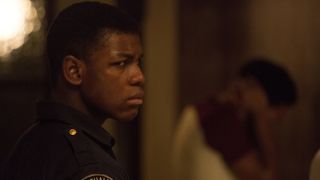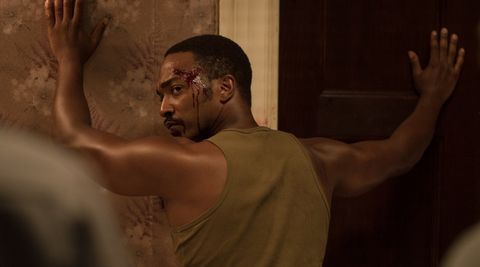GamesRadar+ Verdict
Dunkirk has a rival in the intensity stakes. Expect Bigelow’s deep-cutting drama to be part of the conversation come awards season.
Why you can trust GamesRadar+
Opening with an incendiary recreation of the Detroit race riots that took place in July 1967, this third collaboration between screenwriter Mark Boal and director Kathryn Bigelow, after The Hurt Locker and Zero Dark Thirty, ensures viewers are lacerated by every shattered window, burnt by every Molotov cocktail. By day three of the eruption, swathes of the city have been closed off by the Detroit PD, the Michigan State Police and the National Guard – tanks rumble, artillery booms, black smoke clogs the sky – and hair-trigger cop Krauss (Will Poulter) has killed an African-American by shooting him in the back.
But that’s just the backdrop. Events then zoom in on the Algiers Motel, where Larry Reed (Algee Smith) and Fred Temple (Jacob Latimore), lead vocalist and manager of fledgling soul group the Dramatics, hole up to escape the inferno. Partying with a couple of white girls in from Ohio (Hannah Murray, Kaitlyn Dever), they are descended upon by Krauss and his cop buddies (Ben O’Toole, Jack Reynor) after a prank involving a starter pistol has the authorities radioing about a sniper. What follows is a protractedly brutal re-enactment of the infamous ‘Algiers Motel Incident’, as the aforementioned parties, along with long-term resident Robert Greene (Antony Mackie), a Vietnam vet, are savagely interrogated.

This is Bigelow and Boal again exploring the powder-keg psychology of men in uniform, while the former’s fascination with codes of machismo can be tracked all the way back to her early genre movies Blue Steel, Near Dark and Point Break. Here, however, shit gets all too real, with the ugliness of institutionalised racism – and the terror and violence it incites – lighting a flash-fire under Barry Ackroyd’s spasming camera: abrupt images jostle for air, with their colour, density and focus swimming in and out as if the movie itself is fighting for consciousness.
The performances, naturalistic and naturally dialled up, are strong, with Mackie and Smith branding their agony deep into viewers’ brains, and Poulter tapping into a bigotry so systemic as to make Krauss believe he is acting appropriately. But it is John Boyega’s frozen features and screaming eyes that dominate the screen – playing local security guard Melvin Dismukes, he demonstrates composure, amiability and intelligent authority in early scenes, only to contract into clenched silence as he finds himself looking powerlessly on at the Algiers Motel. Paralysed by fear, does his inability to intervene make him a co-conspirator, or is submission the only feasible response?
It should be said (and it is, in the text that closes out the film) that a certain degree of artistic licence has been exercised in re-staging these terrible events that act as microcosm for not just Detroit but America, though Boal pored over court testimonies and interviewed survivors in a quest for verisimilitude. What is not up for debate is the integrity of Detroit’s intentions, or its relevance in the Black Lives Matter era. It is not just the docudrama style that lends the action immediacy; it is the sad fact that the repugnant events could be torn from today’s headlines.
Detroit is a harrowing, heart-breaking watch, and though it is not without moments of tenderness and healing, it is at pains to avoid the patronising life-lessons and all-too-easy journey into light that culminates the majority of Hollywood social-conscience pictures. Hope is hard-earned, and any grace attained comes at a tremendous cost.
Jamie Graham is the Editor-at-Large of Total Film magazine. You'll likely find them around these parts reviewing the biggest films on the planet and speaking to some of the biggest stars in the business – that's just what Jamie does. Jamie has also written for outlets like SFX and the Sunday Times Culture, and appeared on podcasts exploring the wondrous worlds of occult and horror.

